congress
5th European Stand-up Pouch Conference: The new world of stand-up pouches (German-English simultaneous translation)
Thursday, 13. / Friday, 14. October 2016 - Start 8:45
Information on the download selected
Circular economy for packagings at Lidl and Kaufland
From
Stephan Garvs -
Within recent months, multiple stakeholders increase the pressure towards more ecologic recycling in packaging. For GreenCycle in Germany faces lots of positive prerequisites: a sophisticated plastics industry, the origin markets for both Lidl and Kaufland, citizens which are used to separation of waste as well as a well developed waste and recycling industry. Still we have only few examples for circular-economy-products which can be found in paper and cardboard but also in film and PET. The presentation takes y closer look upon a few examples from GreenCycle. Another focus will be laid upon closing the loop of information alongside this circular processes especially for packaging. Who is not facing this topic today might be lost tomorrow.
Extent: 15 pages
, Size: 1.14 mB, Language:

english
Further presentations in the files
Vanish - A trademark in pouches and cans
From
Arno Melchior -
If FMCGs change a packaging format they have many things to take into consideration. On one hand they need to fulfil the requirements and desires of consumers and they have to assess whether there will be a return on investment. On the other hand it is important to consider all cost factors. It star
... [Show more]ts with the packaging costs, continues in the calculation of costs for the delivery of the material, the machine costs, efficiency comparisons between the two formats, transport costs for the finished product, etc. Last but not least they also have to compare the environmental impact of both variants in order to take an informed decision. The presentation looks into all these details and tries to find the optimized packaging format
Extent: 36 pages
, Size: 6.64 mB, Language:

english
Bag-in-Box and self-standing pouches seen through the eyes of a machinery manufacturer
From
Giuliano Puglia -
Bag-in-Box and stand-up pouch have been developed as alternative to the traditional containers as glass and plastic bottles.
A success in the market segment of flexible packaging with still sufficient space for growth.
This presentation provides general information regarding the two packaging soluti
... [Show more]ons: strengths and weaknesses.
Moreover, this presentation shows how the manufacturers of machineries and flexible packagings evolve in relation to the development of these flexible containers
Extent: 33 pages
, Size: 4.56 mB, Language:

english
When do I use pre-fabricated bags and when do I form inline?
From
Reiner Müller -
The concepts of FS and FFS machines vary in different items - however, there are many common parallels, for example regarding the maximum filling speed. SN offers different concepts for a wide range of performances. Furthermore, machines for manufacturing bags in an average performance range are pro
... [Show more]duced. For different reasons, the manufacturing and filling of bags are realised more and more on separate machines, but combined in one line. The concepts will be introduced by means of examples of different industries during the presentation. The clear and obvious arguments for and against a concept will be analysed from different points of view, with surprising results
Extent: 39 pages
, Size: 4.71 mB, Language:

german
Seal seams in pouches – Imagination and reality
From
Dr. Günter Schubert -
In stand-up pouches, aluminium foil is not only used due to its unmatched barrier, but contributes to safe and fast sealing by its excellent heat conductivity. Model laminates with aluminium foil have been sealed under different conditions and the formation and shape of the seal seams, especially a
... [Show more]t the position of changing from two to four layers of material to be sealed is shown in detail. Furthermore, the failure of seal seams of corresponding filled pouches after drop tests is illustrated. Properly and insufficiently sealed seams of the pouches, especially their failing boundaries between different layers have been monitored by means of different microscopic techniques
Extent: 33 pages
, Size: 4.46 mB, Language:

german
100 % inline seal control
From
Ir. Alexander van Puijenbroek -
Since a long time, it is the wish of all food and pharma packing companies as well as packaging manufacturers, to get 100% control over the seal quality and to avoid leaking packs. Especially the process of spout inserting during the pouch manufacturing needs special care and attention. Micro-channe
... [Show more]ls need to be wiped out!
So far an in-line 100% non-destructive inspection existed only at low speed, batch-wise or with low resolution.
A brand new inspection technology based on infrared, offers the expected high speed, high sensitive solution.
To protect yourself against claims and your customer against inferior products, the QipCam can be the most suitable inspection system.
This presentation will show a brief overview of the major different existing pack integrety inspection technologies and explain in detail the capabilities of the new infrared inspection equipment.
Customer examples and a live demonstration will show the functionality
Extent: 48 pages
, Size: 3.53 mB, Language:

english
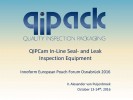
Paper laminates for stand-up pouches
From
Stefan Eitze and
Ronny Kunze -
Due to an ideal laminate composition of paper and polymer layers, advantages regarding sustainability, efficiency, physical properties as well economy emerge and present new packaging concepts in different packaging solutions, pre-fabricated or on reel.
Extent: 19 pages
, Size: 1,014.73 kB, Language:

german
The Euopean stand-up pouch market today and tomorrow
From
Jörg Schönwald -
The stand-up pouch has been developed as model of success within the market segment of flexible packaging. For many years success criterions are in effect making the stand-up pouch as an important container being suitable at the present age. This presentation provides general economic information as
... [Show more] well as market data of packaging and shows country specific data regarding the consumption of stand- up pouches in Europe. The use of different filling goods for bottles are compared with stand-up pouches considering also the container sizes
Extent: 23 pages
, Size: 532.75 kB, Language:

german
Punched paper stand-up pouches with spouts
From
Hein Van den Reek -
If 10 years ago somebody would have said to us: “A paper bottle is possible”, we would have a laugh and maybe didn’t see the necessity. Today Carlsberg develops one. If 10 year ago you would have heard all the plastic trays could become paper you at least would have smiled. Today we make a sta
... [Show more]rt. I don’t think we should get rid of plastics we should redefine them and bring them in contact with paper. What is the definition of “Biobased”? A tree is build up out of fibres which or brought to us from the soil, the seed and the sun. To me that seems pretty biobased.
At Billerud Korsnäs we are working on the stretch ability and forming of paper. And with the right barriers we ca make an embossable pouch: ´A paper stand up pouch´
Extent: 27 pages
, Size: 6.21 mB, Language:

english
Flexo printed high performance pouches - The importance of the correct ink & adhesive combination
From
Colin Smith -
The growth of the high performance printed pouch is not in question – what is open for discussion is how you print it ……….and how you laminate it …….
Historically it was only possible to meet the demanding retort specifications by gravure printing with PVC ink technology and laminating w
... [Show more]ith solvent based adhesive but the landscape is beginning to change, latest developments in printing ink technology now opens the door for flexo printing – meaning cost competitive smaller print runs are now possible.
Going forward developments in adhesive technology will also open the door for the possible use of solvent free or even water based adhesive technology which will in turn increase the options and improve the competitive situation for the printer convertor. A little further away but most definitely on the horizon is digital printing for high performance pouches, with the appropriate support products – Primers & Adhesives – it will soon be possible to think about ultra small run sizes and even personalization of this fast growing, but technically demanding area of the packaging market.�
Extent: 27 pages
, Size: 1.78 mB, Language:

english

The "mono material" stand-up pouch
From
Klaus Renz -
Typical laminated films with different material components can not be recycled materialwise unmixed, or only at great expense. Plastic packaging materials are increasingly in the focus of the sustainability debate. On top the EU legislation requires a fixed recycling rate of materialwise unmixed pla
... [Show more]stic packaging materials.
The following präsentation shows an approach, as by the use of only PP components, including barrier layer, a solution for the popular application stand up pouches, can be achieved, at least partially
Extent: 45 pages
, Size: 9.93 mB, Language:

german
Green Pouch – Concept for 100% recyclable pouches for food
From
John Price -
Why recyclable pouches for food
Additional profit by integral added value
Examples for "green" pouches
Extent: 33 pages
, Size: 2.81 mB, Language:

english
Customer value which inspires - from niche to the global model of success - 25 years of ultrasonic sealing technology for stand-up pouches
From
Thomas Fischer -
Over the last years the stand-up-pouch (SUP) could gain significant market share in flexible packaging.
For many liquid, pasty and fibrous filling goods, but also for dry, powdery products the SUP is the ideal package style.
Increasing demands for higher output of SUP filling lines and thus reduced
... [Show more]cycle times for dosing the product and sealing the top seam, required new strategies and technologies for safe production of tightly sealed top seams at the end of the packaging process.
It is recognized that ultrasonic sealing technology made a huge contribution to solving this challenge over the last 2 decades.
Out of the niche this sealing method became a standard solution for multiple applications within the packaging industry – the required heat to melt down the sealing layer is generated directly within the sealing layer by high frequent mechanical vibrations.
From SUP for beverages, sauerkraut to ready-to-eat-meals and wet pet food – the demand for robust and safe sealing despite of product residues being present in the seam area can be realized with ultrasonic.
For years hundreds of SUP filling and closing lines with thousands of ultrasonic sealing stations in multi-shift operations produce continuously the highest quality at low operation and maintenance costs.
Future film materials with no aluminum, partially based only on one type of polymer, will introduce challenges to the sealing technologies which can already be solved by ultrasonics as of today.
Robust sealing processes and lowest leaker ratios are the result of an intelligent digital ultrasonic generator in combination with durable sealing tools that grant repeatable sealing quality also under varying production conditions
Extent: 41 pages
, Size: 8.08 mB, Language:

german

Circular economy for packagings at Lidl and Kaufland
From
Stephan Garvs -
Within recent months, multiple stakeholders increase the pressure towards more ecologic recycling in packaging. For GreenCycle in Germany faces lots of positive prerequisites: a sophisticated plastics industry, the origin markets for both Lidl and Kaufland, citizens which are used to separation of w
... [Show more]aste as well as a well developed waste and recycling industry. Still we have only few examples for circular-economy-products which can be found in paper and cardboard but also in film and PET. The presentation takes y closer look upon a few examples from GreenCycle. Another focus will be laid upon closing the loop of information alongside this circular processes especially for packaging. Who is not facing this topic today might be lost tomorrow
Extent: 15 pages
, Size: 1.14 mB, Language:

english
© 2025 Innoform Coaching GbR
 english
english
 english
english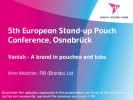
 english
english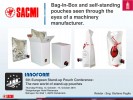
 german
german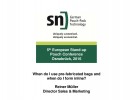
 german
german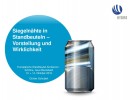
 english
english
 german
german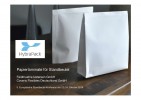
 german
german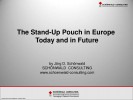
 english
english
 english
english
 german
german
 english
english
 german
german
 english
english